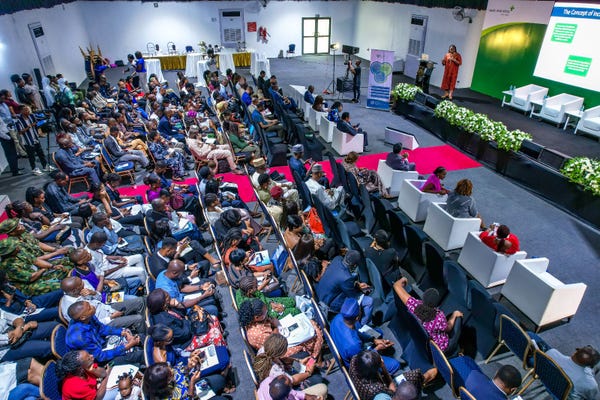Building on the first day's excitement, the second day of Medic West Africa kicked off with talks centred on empowering the value chain sector. Babagana Umara Zulum, Governor of Borno State, was the first to deliver a keynote address at the ‘Empowering Sub-National Healthcare: Pathways to Unlocking Value Chain Potential' held as part of the Healthcare Excellence Forum, followed by commissioners of health each representing their respective state in Nigeria.
The discussions centred around leveraging lessons from diverse sectors like technology, agriculture, and finance to innovate healthcare delivery. Besides introducing attendees on various ways to harness natural resources such as renewable energy to ensure sustainable healthcare, leaders also shared successful initiatives aimed at improving healthcare on a scalable level, and further identified common principles and strategies for innovative delivery.
Samson Fatoki, Deputy Director — Pharma Operations, Drug Evaluation and Research Directorate at NAFDAC, delivered a keynote address at the Leaders Forum on behalf of Professor Mojisola Adeyeye, Director General of NAFDAC. He talked about strengthening regulatory oversight for Nigeria's pharmaceutical industry through collaboration with local industry players, governmental agencies, and academic institutions. Highlighting key priorities such as regulatory compliance, global quality standards, and policy strengthening, he emphasised the need for continual improvement and collaboration to enhance the pharmaceutical industry in Nigeria.

A focal point was the panel session led by the Private Sector Health Alliance of Nigeria (PSHAN) as part of the Leaders Forum on Nigeria's Healthcare Renaissance, which covered the need to drive local healthcare manufacturing, create affordability versus quality in healthcare services, and balance profit motives with public health interests.
Dr. Adetokunbo Shitta-Bey, Chief Executive Officer of Duchess Hospital, shed light on financial aspects, public-private partnerships, and technology in healthcare innovation, stressing on efficient resource allocation and risk management. "We need first to decide what sort of society we want to be, and once we have done that, we will find that all other issues of policy are going to take place. Above all, we need to consider societal values and adopt innovative approaches to improve healthcare outcomes," he stated.
In order to encourage responsibility, Dr. Lola Odedere, Head of Fraud, Waste and Abuse Control at AXA Mansard, indicated the significance of transparency in healthcare procedures and argued for access to insurance information.
"Transparency is key. Why would you call each other to order when things seem to be going in the opposite direction if every healthcare driver can see every process?" she asked.
Dr. Francis Ohanyido, Director-General of the West African Institute of Public Health, emphasised that Nigeria must establish its own healthcare agenda, urged against heedlessly assimilating international models, and supported innovative policy and entrepreneurial methods. "As Nigeria, I think we need to start finding what we think is our own basic agenda," he said, highlighting the necessity for Nigeria to establish its own healthcare agenda. “We must exercise caution while implementing international healthcare models mindlessly,” he added.
He stressed that Nigeria must consider how to advance the health agenda across all policy areas. “We see healthcare via a social perspective. We are not approaching it using an entrepreneurial framework. We must take action on this,” he said.
.jpg?width=600&auto=webp&quality=80&disable=upscale)
Nigeria Health Watch also held a training on strategic communications for healthcare businesses with the goal of countering the loss from medical tourism by highlighting the impact of products on health outcomes.
The objective of this endeavour was to improve Nigeria's standing for medical tourism and foster advancements in the healthcare industry. An interview with Vivianne Ihekweazu, Managing Director of Nigeria Health Watch, revealed the need for private sector organisations to share the impact of their products on health outcomes more through storytelling. She shared case studies of similar initiatives from other nations in the region and how they would transform the advancement of better positioning Nigeria for medical tourism.
Finally, a certified workshop on Quality Patient Safety and Healthcare Standards was held by Advancing Healthcare Excellence in association with the Society of Quality in Healthcare in Nigeria. Among the attendees were notable professionals such as Dr. Ifeoma Udeh from the Lagoon Hospital, who said that the sessions at Medic West Africa exceeded her expectations: "I have acquired the knowledge and abilities to apply patient safety procedures in the medical field, which is especially crucial at the Lagoon Hospital.”
In essence, the collective resonance of these events and activities echoes a resounding message: The imperative for transformative action in Nigeria's healthcare sector is indisputable, and the time for such action is now.
Missed the chance to attend this year? Register for Medic West Africa 2025 for free and gain exclusive access to the region's biggest healthcare industry event.


.jpg?width=600&auto=webp&quality=80&disable=upscale)













.webp?width=700&auto=webp&quality=80&disable=upscale)